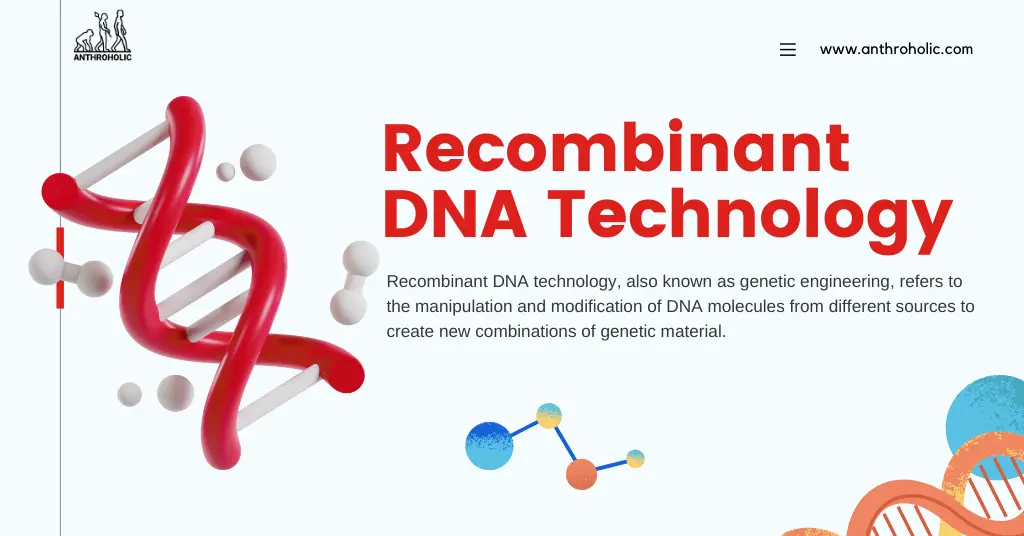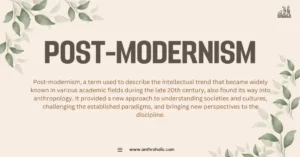AI Answer Evaluation Platform Live Now. Try Free Answer Evaluation Now
Recombinant DNA Technology
Recombinant DNA technology, also known as genetic engineering, refers to the manipulation and modification of DNA molecules from different sources to create new combinations of genetic material [1]. It involves the transfer of genes between organisms, often unrelated, to produce novel traits or products. This technology has revolutionized various fields, including medicine, agriculture, and industry, by enabling scientists to create organisms with desired characteristics.

The concept of recombinant DNA technology emerged from the discovery of DNA’s structure and the understanding of its role in heredity. In 1953, James Watson and Francis Crick elucidated the double-helix structure of DNA, which laid the foundation for subsequent breakthroughs in genetic research [2]. The discovery of restriction enzymes in the early 1970s provided the means to cut and splice DNA fragments from different sources, leading to the creation of recombinant DNA molecules.
Historical Development
The historical development of recombinant DNA technology can be traced back to the pioneering work of Stanley Cohen, Herbert Boyer, and Paul Berg in the early 1970s. In 1972, Paul Berg successfully combined DNA from two different organisms, a bacteriophage and a plasmid, through a process called gene splicing, marking the first demonstration of the creation of recombinant DNA molecules [1].
Following Berg’s achievement, Stanley Cohen and Herbert Boyer advanced the field by developing a method to transfer recombinant DNA molecules into bacterial cells. This breakthrough, known as DNA cloning, allowed for the replication of the recombinant DNA in host cells and the production of large quantities of specific DNA sequences. This technique enabled the isolation and study of individual genes, leading to significant advancements in our understanding of gene function and regulation.
Significance in Anthropology
Recombinant DNA technology has profound significance in the field of anthropology, offering insights into human evolution, migration patterns, and genetic diversity. By analyzing DNA sequences from diverse human populations, scientists can identify genetic variations associated with specific traits and diseases, providing valuable information for understanding human history and population dynamics.
One notable application of recombinant DNA technology in anthropology is the study of mitochondrial DNA (mtDNA) and the Y-chromosome. These genetic markers are inherited maternally (mtDNA) or paternally (Y-chromosome) and can be used to trace ancestral lineages. Comparing mtDNA and Y-chromosome sequences among individuals from different populations helps reconstruct human migration routes and determine genetic relatedness.
Furthermore, recombinant DNA technology has played a crucial role in understanding genetic diseases prevalent in specific populations. By identifying disease-causing mutations and studying their inheritance patterns, researchers can develop targeted diagnostic tests and potential therapies. This knowledge contributes to personalized medicine and the improvement of healthcare practices within different anthropological contexts.
Cultural Beliefs and Attitudes
Recombinant DNA technology has raised diverse cultural beliefs and attitudes across societies, reflecting different perspectives on the manipulation of genetic material. Cultural beliefs often stem from religious, philosophical, or ethical frameworks that influence perceptions of the natural order, human identity, and the sanctity of life.
For example, some religious groups may hold concerns about the perceived interference with divine creation and view recombinant DNA technology as playing God. In contrast, other cultures may embrace genetic engineering as a tool for improving health and well-being, aligning it with their worldview of human agency in shaping the natural world.
Ethical and Moral Considerations
Ethical and moral considerations surrounding recombinant DNA technology are complex and involve questions about the boundaries of scientific intervention, human rights, and social justice. Issues such as the potential for genetic discrimination, the commodification of life, and the equitable access to genetic technologies are central to the ethical discourse [3].
One key ethical concern is the potential misuse of genetic information, particularly in the realms of employment, insurance, and reproductive decision-making. Safeguarding privacy and ensuring that genetic information is not used to discriminate against individuals or marginalized groups is essential for maintaining trust in the technology and protecting individual rights.
Impact on Traditional Knowledge and Practices
Recombinant DNA technology can impact traditional knowledge systems and practices, particularly in indigenous communities. These communities often possess rich ecological knowledge and have developed sustainable agricultural and medicinal practices over generations. The introduction of genetically modified organisms (GMOs) and other genetic technologies can disrupt traditional practices and raise concerns about the preservation of cultural heritage.
Furthermore, the ownership and control of genetic resources have become contentious issues. Traditional knowledge and biological resources from indigenous communities are often used in the development of genetic technologies without adequate recognition or benefit-sharing. This raises questions of cultural appropriation, intellectual property rights, and the need for fair and equitable partnerships between scientists and indigenous communities.
Technological Divide and Access
Recombinant DNA technology has the potential to exacerbate the technological divide and access disparities within societies. Access to genetic technologies, such as genetic testing and gene therapies, may be limited to affluent individuals or populations with robust healthcare systems, while marginalized communities may face barriers to accessing these advancements. This creates a divide between those who can afford and benefit from genetic technologies and those who cannot, leading to further social inequalities.
For instance, genetic testing for hereditary diseases may be more readily available in developed countries, leaving individuals in resource-constrained regions at a disadvantage in terms of early diagnosis and appropriate healthcare interventions. Bridging the technological divide and ensuring equitable access to genetic technologies are crucial for addressing social disparities and promoting social justice.
Economic Factors and Inequality
Recombinant DNA technology can have profound economic implications, potentially contributing to existing socioeconomic inequalities. The development and commercialization of genetic products and therapies may be driven by profit motives, leading to high costs that limit affordability for certain populations. This economic disparity can result in unequal access to the benefits of genetic technologies, further entrenching social and economic inequality.
Additionally, the focus on commercial applications of recombinant DNA technology may divert resources and research efforts away from addressing health concerns and needs of underserved populations. This economic-driven approach can perpetuate existing disparities in healthcare and exacerbate social inequities.
Social Acceptance and Resistance
The social acceptance and resistance toward recombinant DNA technology can have significant social implications. Public attitudes, beliefs, and perceptions about genetic engineering can shape its societal acceptance or resistance. Concerns about the potential risks, ethical considerations, and unforeseen consequences of genetic modifications may lead to skepticism and resistance in certain communities or cultural groups.
Resistance to genetic technologies can be rooted in cultural, religious, or ethical beliefs that view the manipulation of genetic material as unnatural or morally objectionable. Furthermore, the perception of genetic technologies as potentially leading to eugenics or undermining human dignity can contribute to societal resistance. Engaging in inclusive and transparent discussions, addressing concerns, and involving diverse stakeholders in decision-making processes can help navigate the social acceptance and resistance surrounding recombinant DNA technology.
Ethnographic Studies and Fieldwork
Anthropologists employ ethnographic studies and fieldwork to gain in-depth insights into the social, cultural, and ethical dimensions of recombinant DNA technology. By immersing themselves in the communities and contexts where genetic research and applications occur, anthropologists can understand the local perspectives, values, and practices surrounding genetic technologies. Ethnographic research helps uncover the social dynamics, beliefs, and concerns that shape the acceptance or resistance towards recombinant DNA technology within specific cultural contexts.
Through participant observation, interviews, and engagement with stakeholders, anthropologists explore how genetic technologies are understood, interpreted, and incorporated into everyday life. Ethnographic studies provide rich qualitative data that shed light on the social implications, cultural beliefs, and local responses to recombinant DNA technology.
Interdisciplinary Collaborations
Anthropological approaches to understanding recombinant DNA technology often involve interdisciplinary collaborations. Recognizing the complex nature of genetic research and its social implications, anthropologists collaborate with scientists, bioethicists, policymakers, and other stakeholders to foster dialogue and bridge disciplinary perspectives. Interdisciplinary collaborations facilitate the integration of diverse knowledge systems, promote critical reflection, and inform the development of responsible and contextually grounded practices.
These collaborations enable anthropologists to contribute anthropological perspectives, such as cultural relativism, the social construction of technology, and the examination of power dynamics, to broader discussions surrounding recombinant DNA technology. Through interdisciplinary engagements, anthropologists contribute to the development of more socially informed policies, regulations, and ethical frameworks that address the complex social and cultural implications of genetic technologies.
Future Directions and Controversies
Emerging Technologies and Trends:
Recombinant DNA technology continues to evolve, leading to the emergence of new genetic engineering techniques and applications. Technologies such as CRISPR-Cas9 have revolutionized genome editing, allowing for precise and efficient modifications of DNA sequences. Other advancements, such as synthetic biology and gene drives, hold promise for addressing pressing global challenges like disease control, food security, and environmental sustainability.
However, these emerging technologies also raise important ethical, social, and safety concerns. The potential for unintended consequences, such as off-target effects or the accidental release of genetically modified organisms into the environment, necessitates ongoing research, risk assessment, and responsible development.
Policy and Governance Considerations:
As recombinant DNA technology continues to advance, policy and governance frameworks play a crucial role in ensuring responsible and equitable use. Policymakers and regulators must grapple with complex issues related to safety, environmental impacts, consent, privacy, and the equitable distribution of benefits and risks. Developing robust regulations and guidelines that balance scientific progress, societal concerns, and ethical considerations is vital for fostering public trust and ensuring responsible innovation.
Additionally, international cooperation and harmonization of policies are necessary to address global challenges associated with recombinant DNA technology. Collaborative efforts can facilitate the exchange of knowledge, sharing of best practices, and coordination of regulatory frameworks across different countries and regions.
Engaging Public Dialogue and Decision-making:
Engaging the public in dialogue and decision-making processes is essential for addressing controversies and shaping the future of recombinant DNA technology. Public understanding, awareness, and input can influence policy development, research priorities, and the direction of technological advancements. Engaging diverse stakeholders, including communities affected by genetic technologies, helps ensure that societal values, concerns, and aspirations are incorporated into decision-making processes.
Promoting inclusive and informed public dialogue requires effective science communication, educational initiatives, and deliberative approaches that enable meaningful participation. Such approaches foster dialogue, address uncertainties, and encourage open discussions about the potential benefits, risks, and trade-offs associated with recombinant DNA technology.
References
[1] Berg, P., Baltimore, D., Boyer, H. W., Cohen, S. N., Davis, R. W., Hogness, D. S., Nathans, D., Roblin, R., & Watson, J. D. (1974). Summary statement of the Asilomar conference on recombinant DNA molecules. Proceedings of the National Academy of Sciences, 71(9), 3449-3452. doi: 10.1073/pnas.71.9.3449
[2] Watson, J. D., & Crick, F. H. (1953). Molecular structure of nucleic acids: A structure for deoxyribose nucleic acid. Nature, 171(4356), 737-738. https://doi.org/10.1038/171737a0
[3] Wertz, D. C., Fletcher, J. C., & Berg, K. (2003). Privacy and genetic information: Applications of family values and perspectives. In R. A. Bulger, E. B. Heitman, & S. J. Reiser (Eds.), The ethical dimensions of the biological and health sciences (pp. 134-145). Cambridge University Press.



